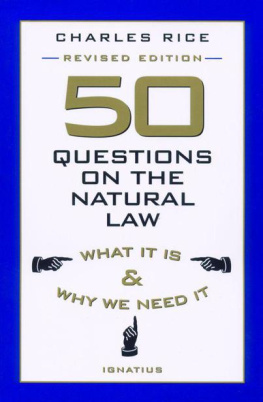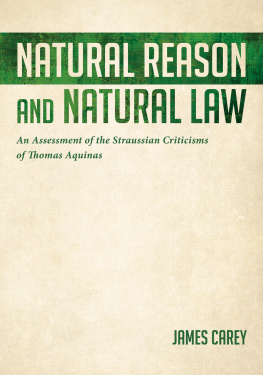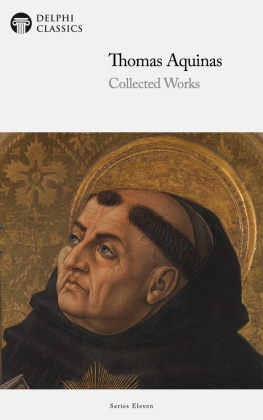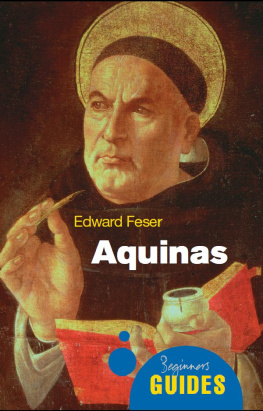50 Questions on the Natural Law
CHARLES E. RICE
50
Questions
on the
Natural Law
What It Is and
Why We Need It
IGNATIUS PRESS SAN FRANCISCO
Cover design by Roxanne Mei Lum
1993, 1995, 1999 Ignatius Press, San Francisco
All rights reserved
ISBN 978-0898-707-502
Library of Congress catalogue number 99-73020
Printed in the United States of America
To my wife, Mary,
and our children
and grandchildren .
Contents
1. Does anybody really care about natural law?
2. Can natural law thinking really make a difference?
3. But what is natural law?
4. Isnt natural law just another Catholic dogma?
5. How does natural law differ from the dominant jurisprudence today?
6. Lets talk about Aquinas. Why is he so important? How does he define natural law and where does he put it in the big picture?
7. Is the natural law the same for everybody? Does everybody know what it requires? Can it be changed?
8. How does the law enacted by the statethe human lawrelate to the natural law?
9. What is the common good that the human law is supposed to promote? Shouldnt the focus be on individuals and their rights?
10. What about animals? Dont they have rights?
11. Did Aquinas have an opinion as to which form of government is best? Was he a conservative or a liberal?
12. Am I bound in conscience to obey the human law? What if that law is unjust?
13. Wait a minute. If people who follow Aquinas are so sure they are right as to the meaning of natural law, wont they compel everyone to follow their rules? Wont they use the law to make people be good?
14. Look. Isnt the bottom line the fact that the law should not legislate morality? Where do you get the right to impose your morality on me ?
15. Isnt the job of a judge to apply the Constitution, as written, according to the intent of those who adopted it rather than according to his own view of what is useful or just?
16. But arent natural law concepts part of the Constitution itself?
17. Do you seriously claim that a judge can properly use natural law to rule that a statute, or even part of the Constitution itself, is unjust and void?
18. Back up a minute. You said before that Aquinas gives us sure answers to all sorts of questions on natural law. But havent philosophers proven that we cant ever be sure of anything in the first place?
19. All right. So it doesnt make sense to say that we cant know anything . But what can we know and how do we know it?
20. What about man? As far as we can tell, he is just a body, a collection of atoms. Right?
21. So what if man has a spiritual soul? What difference does that make?
22. Do you really claim that we can prove from reason alone that God exists?
23. What can we know through reason about God?
24. Why bring revelation or religion into this? All you will do is turn people off.
25. All right. Revelation might have some bearing on the natural law. So lets start at the top. What does it tell us about God himself?
26. But why were human beings created in the first place?
27. What does original sin have to do with our understanding of natural law?
28. Where does Christ fit into the natural law picture?
29. I respect Christ as a good man and a great teacher. But how could it be reasonable to conclude that he is God? And who cares? What difference does it make for the natural law whether Christ is or is not God?
30. Why bring the Resurrection of Christ into a book on natural law?
31. Suppose you are right and Christ is God, the Author of the natural law. So what? How do we know what he wants us to do?
32. I still dont get it. If the natural law is knowable through reason, where does the Catholic Church get the right to tell me what it means? Isnt my reason as good as the Popes?
33. How can it be right for the Pope to tell me what the natural law means? Dont I have to follow my own conscience?
34. But is there really a right or wrong that is the same for everybody? Doesnt it depend on the person and the situation?
35. So you treat the Magisterium, the teaching authority of the Church, as sort of a superteacher of natural law philosophy. Right?
36. I dont mind if you claim that Catholics should obey the Magisterium. But what is the Pope saying about the natural law that is so special that the rest of ussociety at largeshould accept it?
37. So the Magisterium argues for the Christian vision of the human person. So what? How does that relate to the problems of life in the real world?
38. Get down to specifics. According to what principles would the Magisterium organize society and the economy?
39. If the Pope rejects both socialism and consumerism, whats his answer? What about private property? Where does he come down on that?
40. So if the Magisterium affirms property rights and opposes socialism, does it therefore endorse capitalism?
41. What is the family and whats so special about it?
42. Why does the Church put so much emphasis on contraception? I think it enables people to exercise responsible free choice. Why does the Church oppose it?
43. Isnt natural family planning the same as contraception? Isnt the intent of both the same, to avoid having children?
44. What insight does the Magisterium offer on homosexual activity and gay rights?
45. Okay. So the Pope thinks the state should promote the family. But how?
46. What does the Magisterium see as the origin of the antilife mentality?
47. Hasnt the Church changed her position on abortion? Didnt Aquinas deny that life begins at conception? Anyway, is abortion always wrong?
48. How does the Magisterium apply the natural law to euthanasia? Can the natural law tell us when to pull the plug in a particular case?
49. Why is the Church opposed to science and technology? If we are pro-life and want children, why cant we use in vitro fertilization, surrogate motherhood, and other techniques, if necessary, to enable us to have them? And whats wrong with experimenting on aborted babies or using their tissues for transplants to save lives?
50. Isnt the natural law a terminal case, a dying relic of the past? Isnt it unrealistic to expect people to take it seriously today?
Acknowledgments
I gratefully acknowledge the generous assistance of Mrs. Lois Plawecki in expertly preparing and managing the manuscript from start to finish; of Carl Schmitt, an alumnus of Thomas Aquinas College and of Notre Dame Law School, in the research and evaluation of the manuscript; of John Murdock of Notre Dame Law School, in providing essential research and comments on the project; of Mrs. Carmela Kinslow, Dwight King, and the Notre Dame Law Library research staff in their prompt acquisition of often arcane materials; of Professors Douglas W. Kmiec and Edward J. Murphy of Notre Dame Law School in their helpful comments and guidance; of Fr. Robert Connor of the Prelature of Opus Dei in providing many indispensable insights and clarifications; and especially of my wife, Mary, in reviewing and evaluating the concepts and drafts.
Abbreviations
In this book abbreviations are used for frequently cited sources. In all quotations, unless otherwise indicated, emphasis is in the original.
C.A . Pope John Paul II. Encyclical Centesimus Annus (1991).
C.C.C. Catechism of the Catholic Church (1992).
E.V . Pope John Paul II. Encyclical Evangelium Vitae (1995).
F.C . Pope John Paul II. Apostolic Exhortation Familiaris Consortio (1981).
F.R . Pope John Paul II. Encyclical Fides et Ratio (1998).
L.F . Pope John Paul II. Letter to Families (1994).
P.C.H.P . Pope John Paul II. Letter to the Bishops of the Catholic Church on the Pastoral Care of Homosexual Persons (1986).








